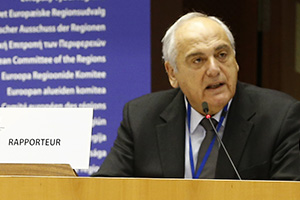Europe on the move: cities and regions for decarbonisation and socially fair transition of road transport
Modernising the European road transport sector in an efficient, sustainable and socially fair way was at the heart of the discussion of two opinions adopted during the European Committee of the Region's (CoR) plenary session on 1 February. The opinions are based on the European Commission's initiative "Europe on the Move", which aims to help the transport sector to stay competitive in a socially fair transition towards clean energy and digitalisation.
" Europe on the Move " is a wide-ranging set of initiatives by the European Commission to take action to fundamental modernise European mobility and transport. The first series of eight legislative initiatives specifically target road transport, which is of high importance for the economic competitiveness of cities and regions as well as for strengthening social, economic and territorial cohesion in the EU.

" Road transport is a sector characterised by wide disparities in labour legislation and pay. Those differences in working conditions can result in a distortion of competition and compromise road safety, for example when it comes to the calculation of drivers' rest time ", said Spyros Spyridon (EL/EPP), rapporteur on the opinion " Europe on the Move: Labour aspects of road transport ".
He saw the source of the problem mainly in the absence of a sufficient level of social cohesion between Member States and regions, as borne out by a high difference in social and economic living standards. " The problem is particularly acute in cross-border regions, where there are significant differences in living standards on either side of the border. If we increase cohesion, the wage gap will narrow - making many labour and cabotage* rules unnecessary - and the risk of social dumping and the distortion of competition will be reduced. Until we reach this goal a weighted daily allowance based on per capita GDP would be an innovative solution to simplify the current administratively burdensome and costly posting procedure. It could be paid to drivers in accordance with both the country providing the transport work and the country where the transport company is located ", Mr Spyridon said.
The opinion welcomes the increased flexibility of time and rest conditions, but calls for a clearer definition of driving times, as well as the creation of safe and secure parking areas so that rest does not involve having to supervise the goods transported. The rapporteur further emphasised the systematisation of audits and exchange of information between control authorities via smart tachographs and other common computer databases.
Ivan Žagar , (SI/EPP) Mayor of Slovenska Bistrica and rapporteur of the opinion on " Europe on the move: Seamless mobility solutions ", focused on the reduction of the environmental impact of transport with the help of road tolls to better reflect the actual cost of transport and reducing its negative consequences, such as pollution and congestion.
" Transport is the only sector where CO2 emissions are still above 1990 levels and are continuing to grow in many Member States. Road transport alone contributes almost a fifth of the EU's total greenhouse gas emissions. Charging users and polluters undoubtedly has to play the key role in decarbonisation. However, we need to tread carefully, because if tolls are not implemented properly and if, for example, traffic flows out of toll networks and onto local roads, the local population will suffer most ", said Mr Žagar.
The rapporteur further welcomed the shift to tolls based on distance travelled, as they are fairer than flat-rate charging for road use, but warned that calculation of the tolls should not compromise social and territorial cohesion and take into account the differences between regions in terms of traffic density as well as the distance between business and residential centres.
He also stressed that Member States should be required to reinvest at least 15% of their toll revenues in the local and regional infrastructure. This would be especially helpful in sparsely-populated and outlying regions to ensure the sustainability of those systems and a better connection to the European network, leading to more territorial cohesion.
Source: European Committee of the Regions
- 278 reads
Human Rights
Fostering a More Humane World: The 28th Eurasian Economic Summi

Conscience, Hope, and Action: Keys to Global Peace and Sustainability

Ringing FOWPAL’s Peace Bell for the World:Nobel Peace Prize Laureates’ Visions and Actions

Protecting the World’s Cultural Diversity for a Sustainable Future

Puppet Show I International Friendship Day 2020

